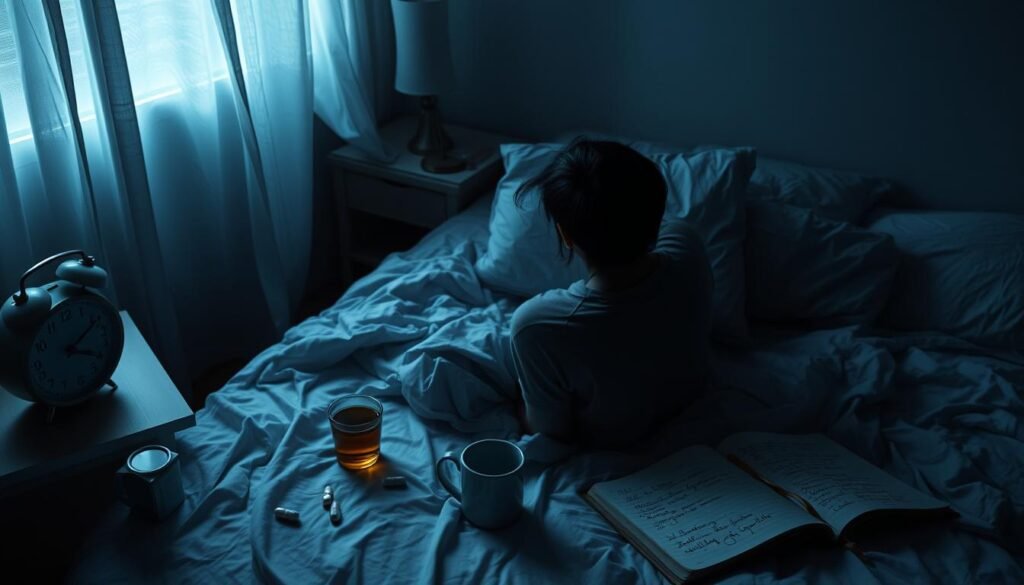About 70 million people in the U.S. struggle with chronic insomnia, says the National Institute of Health. 35% of adults think their sleep quality is poor, based on a National Sleep Foundation survey. Insomnia can cause sleepless nights and harm health, leading to problems like hypertension and heart disease.
Going to insomnia treatment centers is a crucial step for many. These centers are skilled in handling sleep disorders. They offer customized care, which may include cognitive behavioral therapy and managing medications. Places like the Mayo Clinic are well-known top-rated insomnia clinics you might consider.
Key Takeaways
- Chronic insomnia impacts 70 million people in the U.S.
- 35% of adults describe their sleep quality as poor.
- Accredited centers like the Mayo Clinic offer specialized insomnia treatment.
- Insomnia can lead to serious health complications.
- Effective therapies include cognitive behavioral therapy and medication management.
- Seeking help at insomnia treatment centers can significantly improve quality of life.
Understanding Insomnia and Its Impact on Sleep Quality
Insomnia is a common problem, affecting 33-50% of adults. It’s not just struggling to fall asleep. It deeply affects your day and sleep quality. Insomnia can make you feel tired, irritable, and less sharp during the day.
About 10 to 15% of people deal with insomnia. It’s more common in women, those who are divorced, and older adults. If you have trouble sleeping at least three times a week for more than three months, it’s called chronic insomnia.
Not dealing with insomnia can lead to major health problems. These include depression, anxiety, heart disease, and diabetes. It can also hurt your immune system and increase the chance of car accidents.
Genetics can affect your risk of insomnia. Certain genes make some people more likely to have sleep problems. Conditions like gastroesophageal reflux disease (GERD) can triple your chances of experiencing insomnia. This shows how health issues can be related.
To manage insomnia well, a mix of strategies is essential. It’s important to develop good sleep habits. Treatment options range from medication to therapy. Seeking help for mental health is also crucial in tackling insomnia’s underlying causes.
| Category | Details |
|---|---|
| Prevalence | 33-50% of adults experience symptoms; 10-15% have chronic insomnia |
| At-Risk Demographics | Higher rates in females, older adults, and those with loss of loved ones |
| Health Risks | Increased risk for depression, anxiety, cardiovascular issues, type 2 diabetes |
| Genetic Factors | Apolipoprotein E4, PER3, Clock, 5-HTTLPR linked to insomnia |
| Management Strategies | Good sleep habits, medications, mental healthcare |
The Difference Between Sleep Deprivation and Insomnia
Knowing how sleep deprivation differs from insomnia is key to addressing sleep issues well. Sleep deprivation happens when you don’t get enough sleep because of your lifestyle or obligations. This situation can come from busy work hours, hanging out with friends, or even just personal habits. At some time, most people face this, leading to health risks.
Insomnia, however, is labeled as a medical issue based on the ‘Rule of 3’s.’ It means having trouble falling asleep for over 30 minutes, waking up too often at night, and having these troubles at least three nights a week for over three weeks. Insomnia sticks around even when you have the chance to sleep and can increase the chance of serious health problems.
Those with insomnia may lay in bed for hours without being able to sleep. Cognitive-behavioral therapy helps by changing the negative thoughts about sleep. Medicines like Zolpidem and Eszopiclone can also help those struggling.
Understanding these differences lets doctors create better care plans. It’s crucial to look into sleep habits since both lack of sleep and insomnia can harm mental health and how well our brain works.
Common Causes of Chronic Insomnia
About one-third of people in the U.S. struggle with chronic insomnia. Roughly 10% to 15% feel its long-term impact deeply. Knowing why insomnia happens is key. It lets people figure out what’s causing it and how to deal with it. Things like bad sleep habits and too much stress play a big role. They create a vicious cycle that’s hard to escape.
Lifestyle Factors Contributing to Insomnia
Lifestyle choices have a big effect on chronic insomnia. Main factors include:
- Poor sleep habits, such as irregular sleep schedules
- Late-night screen time from phones, tablets, and TVs
- Unhealthy nighttime routines, including the consumption of caffeine or heavy meals before bed
- High levels of stress and anxiety from work or personal matters
Many suffering from insomnia deal with big life stressors or substance abuse. It’s key to tackle these lifestyle issues. Creating a plan tailored to improve sleep quality is vital. For more insight, individuals can read up on the common causes of insomnia.
Medical Conditions Associated with Insomnia
Medical issues can also cause chronic insomnia. Some of these issues are:
| Medical Condition | Description |
|---|---|
| Depression | Often leads to sleep disturbances due to mood regulation issues. |
| Chronic Pain | Painful conditions interfere with the ability to fall or stay asleep. |
| Sleep Apnea | Causes intermittent breathing interruptions, leading to poor sleep quality. |
| Anxiety Disorders | Heighten hyperarousal, making it difficult to relax enough to sleep. |
| Cardiovascular Disease | Can cause discomfort and anxiety during sleep. |
It’s important to identify these medical conditions when dealing with chronic insomnia. Getting help from a professional is crucial. They can offer care that is specific to each person’s needs.
Recognizing Insomnia Symptoms
It’s important to know the symptoms of insomnia for good management. People with insomnia often find it hard to start sleeping. They might wake up often during the night. Or, they might wake up too early and can’t sleep again. This leads to being very tired during the day.
This tiredness can affect daily life and how well someone can work or study. Besides sleep problems, people with insomnia may feel moody or find it hard to pay attention. Feeling tired a lot can also hurt personal relationships and well-being. Knowing these symptoms helps in getting the right help quickly. This can be at places that specialize in treating insomnia. There, people can get support and advice on how to deal with insomnia effectively.

Importance of Accurate Diagnosis for Insomnia
Getting the right diagnosis is key for effectively tackling insomnia. Doctors look at symptoms, sleep habits, and health history. They might use sleep diaries or questionnaires to collect important info. Sometimes, they track sleep with methods like actigraphy or polysomnography, offering deep insights into sleep problems.
It’s vital to know if insomnia stands alone or comes with other health issues. This knowledge helps doctors create tailored treatments. For example, women face insomnia more than men. This fact is crucial for successful diagnosis and treatment approaches.
Understanding who gets insomnia shows us its impact. About one in three people reported symptoms last year. But, only 6% to 15% actually fit the strict criteria for insomnia. These numbers highlight how essential accurate diagnosis is for managing this common problem.
To see if treatments are working, doctors monitor sleep symptoms closely. They use both objective measures and therapy. Right treatment not only boosts sleep quality but also overall health and productivity. This matters a lot since insomnia costs the U.S. $30 billion to $107 billion yearly.
| Diagnosis Method | Description | Purpose |
|---|---|---|
| Sleep Diary | A record of daily sleep habits and disturbances. | Identifies patterns over time. |
| Actigraphy | A wearable device that monitors movement during sleep. | Assesses sleep-wake cycles. |
| Polysomnography | A comprehensive sleep study that records brain waves, oxygen levels, heart rate, and breathing. | Provides in-depth understanding of sleep stages and disturbances. |
In summary, accurate diagnosis for insomnia is incredibly important. Without it, people might struggle longer with sleep issues. Finding the problem and targeting it with the right treatments help people sleep better. This leads to better overall health and happiness.
Insomnia Treatment Centers: Specialized Care for Better Sleep
Many people can’t sleep well because of insomnia. This problem affects lots of adults. Insomnia treatment centers offer special care to make sleep better. They have experts like lung doctors and sleep psychologists who work together. They make sure everyone gets a plan that’s just for them.
These centers start by figuring out the problem. They look at your health history, check you out, and talk about how you sleep. They often use polysomnography to learn more. This test watches your eye movements, brain activity, and body changes while you sleep.
Places like the Mayo Clinic set high standards for treating insomnia. These centers find out what kind of sleep problems a person has. This helps them decide how to help. They might suggest changing how you live, therapy, or medicine depending on your needs.
After finding out what’s wrong, these centers help you find solutions. They keep supporting you and make changes if needed to help you sleep better. The goal of their teamwork is to improve your sleep. This can make your overall health and life better.

Effective Insomnia Therapy Options Available
Addressing insomnia effectively involves exploring various therapy options for lasting improvements. Cognitive Behavioral Therapy for Insomnia (CBT-I) is highly recommended. It’s an evidence-based approach focusing on changing negative sleep thoughts and behaviors. Patients learn skills to improve sleep habits and manage anxiety. Studies show CBT for insomnia is as good or better than prescription sleeping pills.
Cognitive Behavioral Therapy for Insomnia
CBT-I usually has 6 to 8 sessions, improving sleep in 70% to 80% of people with primary insomnia. It teaches about good sleep hygiene, healthier sleep routines, and relaxation techniques. Those interested should find qualified therapists from accredited programs.
Medication Management for Insomnia Treatment
Although CBT-I is preferred, medication management is sometimes necessary for short-term relief. Prescription options like Eszopiclone (Lunesta), Ramelteon (Rozerem), and Zolpidem tartrate (Ambien) offer temporary help. Yet, they’re not for long-term use. Doctors warn against using these medications for more than a few weeks. Over-the-counter sleep aids can help but might cause daytime drowsiness and other side effects.
Lifestyle changes also boost sleep quality. Staying active, keeping a consistent sleep schedule, and making your sleeping area cozy are key. For comprehensive info on insomnia treatments, check out Mayo Clinic’s guidelines.
Holistic Approaches to Insomnia Treatment
In recent years, holistic insomnia treatment has gained popularity. It focuses on both mind and body. Many people try alternative therapies to improve sleep. These practices aim to ease symptoms and boost overall well-being.
Key elements of holistic insomnia treatment include:
- Mindfulness and meditation: These help reduce stress and promote relaxation.
- Yoga: It improves physical and mental balance, aiding those with sleep problems.
- Acupuncture: It is shown to help regulate sleep patterns.
- Aromatherapy: Oils like lavender or chamomile can help with sleep.
- Herbal remedies: Options like valerian root support natural sleep.
Many treatment centers now include these therapies. They tailor programs to fit each person’s needs. Understanding the complexity of sleep issues allows for personalized care.

Research on holistic methods is growing. Patients are blending traditional and alternative therapies. This mix addresses insomnia’s root causes, improving life quality.
Choosing the Right Insomnia Treatment Center
Finding the right place for insomnia treatment is key to sleeping well again. It’s important to look at different factors to ensure the care is just right. One important thing to check is if the center is accredited. If it’s recognized by groups like the American Academy of Sleep Medicine, it means they stick to strict quality and safety rules.
Accreditation and Quality of Care
Choosing an insomnia treatment center wisely means checking if it’s accredited. Facilities with this status focus on keeping patients safe and giving high-quality service. Being accredited shows that the center follows the rules for treating sleep issues well. It’s smart to look at what other patients say and the center’s success rate before deciding.
Expertise of Medical Staff in Insomnia Clinics
The talent of the medical team deeply affects how well insomnia can be treated. Centers with highly trained doctors and therapists often see better results. It’s key to look into the qualifications and experience of the staff. Clinics that specialize in treatments backed by science, like Cognitive Behavioral Therapy for Insomnia (CBT-I), tend to offer more successful treatments. Working together, they improve the chances of beating insomnia.
Conclusion
Insomnia treatment centers are key in helping people fight sleep problems. They offer vital resources and specialized help. About one third of people face chronic insomnia. Knowing the symptoms and understanding the condition are the first steps towards getting better.
Cognitive Behavioral Therapy for Insomnia (CBT-I) proves to be very effective. It’s a top recommendation by health experts. This therapy has helped many improve their sleep quality significantly.
While there are good treatments for insomnia, getting them is not always easy. The Veterans Health Administration shows how training can boost insomnia care. They focus on making therapy like CBT-I more available. Picking the best treatment center means patients get care that truly suits their needs. This helps them find their way to better sleep.
Finding relief from sleep issues involves proper diagnosis and expert advice on sleep habits. Changes in lifestyle also play a huge part. Sleep clinics use a team of experts for a well-rounded treatment plan. For those seeking help, understanding these options is crucial. For more info, check out this in-depth article on insomnia treatments.
Pingback: Insomnia Cure: Proven Strategies to Conquer Sleeplessness – Biotinbloom
Pingback: Best Treatment for Insomnia: A Comprehensive Guide – Biotinbloom
Pingback: The Doctor for Insomnia: Who Can Provide Relief? – Biotinbloom